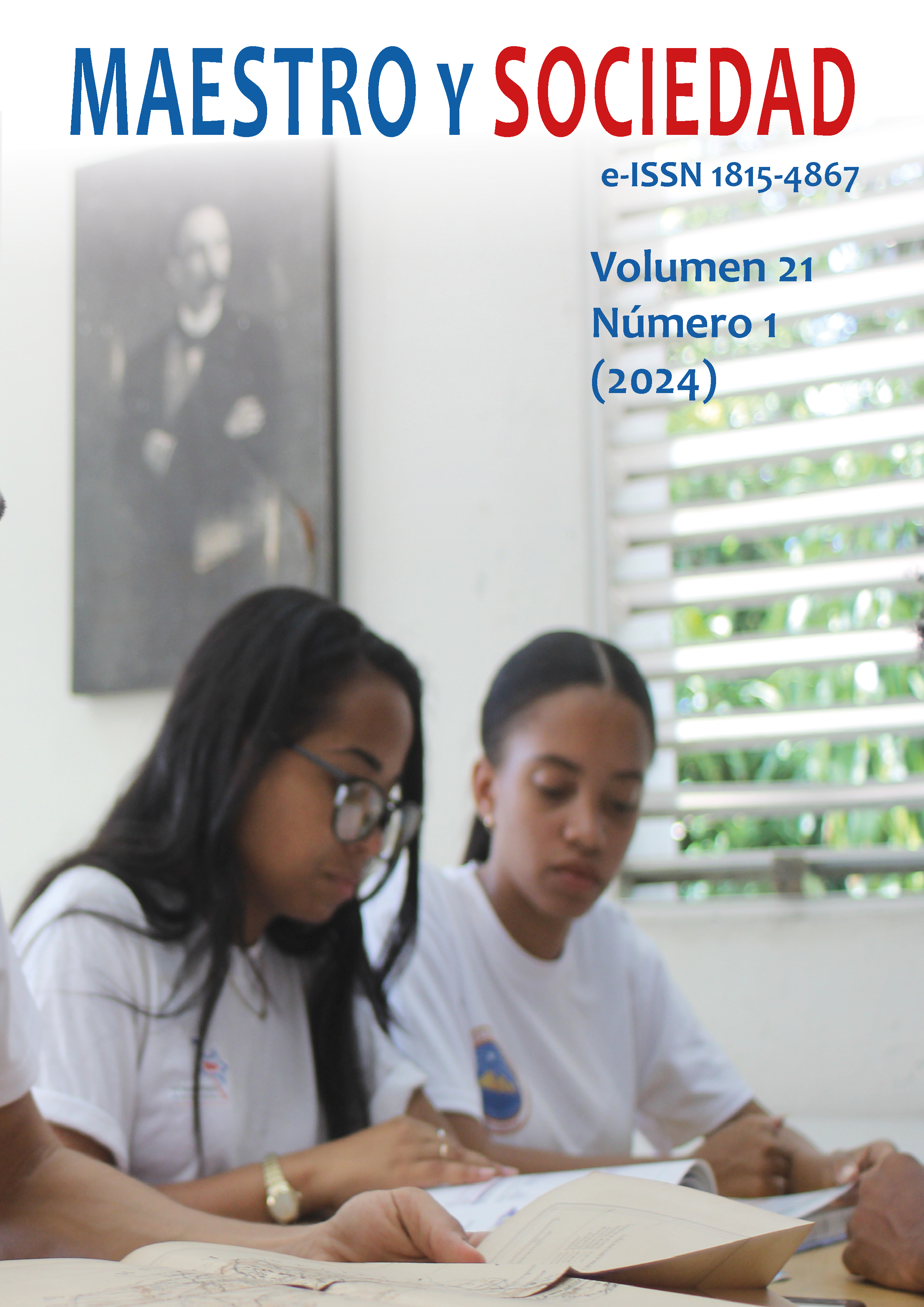La práctica pedagógica en los estudiantes de la carrera Licenciatura en Educación Geografía con un enfoque ecológico
Palavras-chave:
práctica pedagógica, enfoque ecológico, ecología relacional didácticaResumo
Introducción: A escala mundial los años 60 inauguraron transformaciones en los más variados planos de la vida de las personas. Al hablar del enfoque ecológico, se hace referencia básicamente, a la relación entre el individuo y su relación con el medio teniendo en cuenta el entorno. Su unidad de atención es el hombre en sus múltiples roles sociales, sus interacciones con el grupo y con el medio ambiente, el que comprende las instituciones sociales, políticas, comerciales, etc.; con lo que vincula también su pertenencia a una cultura, a un grupo étnico y a una clase social. Materiales y métodos: El trabajo se orienta a atender una de las líneas temáticas que resultan de necesidad en la formación del profesional de Educación Geografía, por lo que representa su preparación en la práctica pedagógica. Desde esta visión se introduce el enfoque ecológico para ofrecer una óptica integradora en la relación que se expresa entre los fenómenos de la naturaleza y la sociedad. Resultados: Es así, que los procedimientos que se ofrecen favorecen la formación del profesor de Geografía y lo ponen en condiciones en la práctica pedagógica de dar tratamiento al contenido geográfico desde un enfoque ecológico integral, contextualizado a la realidad geográfica actual. Discusión: Teniendo como referente a la Ecología Relacional Didáctica, la cual tiene su fundamento en la propia Didáctica como ciencia que sustenta la lógica de los contenidos de la formación integral del profesional de la Geografía. Conclusiones: Se logra entonces, una lógica integradora encargada de generar los impulsos didácticos necesarios en la especialidad de Geografía.
Referências
Addine, F., Calzado, D., Miranda, T. y García, G. (2003). Modelo para el establecimiento de relaciones interdisciplinarias en los profesionales de la educación. Resultado de Proyecto de Investigación. (s.e.).
Addine Fernández, F. y García Batista, G. (2001). La interacción: núcleo de las relaciones interdisciplinarias en el proceso de la práctica laboral investigativa de los profesionales de la educación una propuesta. (s.e.).
Álvarez Cruz, P. (2012). Enfoques de la ciencia geográfica y su proyección en el proceso de enseñanza-aprendizaje. Varona, (54), 58-64. https://www.redalyc.org/articulo.oa?id=360633906011
Davydov, V. (1979). Tipos de Generalización en la enseñanza. Editorial Pueblo y Educación.
Da Silva Tunes, et al. (2014). El enfoque ecológico: una experiencia en la enseñanza de Español como lengua extranjera. Diálogos Latinoamericanos, (22), 59-63. https://www.redalyc.org/articulo.oa?id=16230854006
Edin, D. (2014). Los enfoques de la Geografía en suevolución como ciencia. Revista Geográfica Digital. IGUNNE, 11(21). http://hum.unne.edu.ar/revistas/geoweb/default.htm
Pozo, J. I. (1987). Un modelo de cambio conceptual en la instrucción, de. Aprendizaje de la ciencia y pensamiento causal. Visor Aprendizaje.
Silvestre, M. et al. (1994). Una concepción didáctica para una enseñanza desarrolladora. Ediciones CEIDE.
Zilberstein, J. (1998). Diagnóstico del aprendizaje de nuestros alumnos. Desafío Escolar.
Publicado
Como Citar
Edição
Seção
Licença
Copyright (c) 2024 Rogelio Voltaire Basil, Geovanis Kens Basil, Graimiris Fuentes Heredia

Este trabalho está licenciado sob uma licença Creative Commons Attribution-NonCommercial-NoDerivatives 4.0 International License.
Esta revista proporciona un acceso abierto inmediato a su contenido, basado en el principio de que ofrecer al público un acceso libre a las investigaciones ayuda a un mayor intercambio global de conocimiento. Cada autor es responsable del contenido de cada uno de sus artículos. Los artículos pueden ser inéditos o estar disponibles previamente en servidores de preprints reconocidos por la revista. Sin embargo, no se permite la duplicación de la publicación o traducción de un artículo ya publicado en otra revista o como capítulo de un libro.
This journal provides immediate open access to its content, based on the principle that providing the public with free access to research supports a greater global exchange of knowledge. Each author is responsible for the content of each of their articles. Articles may be previously unpublished or available on preprint servers recognized by the journal. However, duplication of publication or translation of an article already published in another journal or as a book chapter is not permitted.
Esta revista oferece acesso aberto imediato ao seu conteúdo, com base no princípio de que oferecer ao público acesso gratuito à pesquisa contribui para um maior intercâmbio global de conhecimento. Cada autor é responsável pelo conteúdo de cada um de seus artigos. Os artigos poderão ser inéditos ou estar previamente disponíveis em servidores de preprints reconhecidos pela revista. No entanto, não é permitida a duplicação de publicação ou tradução de artigo já publicado em outro periódico ou como capítulo de livro.



























 Universidad de Oriente
Universidad de Oriente 